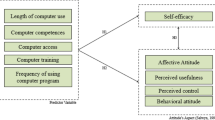Abstract
The purpose of this study is to make clear the relationships between student’s self-efficacy and learning experience of information education in case of junior high school. Two investigations were implemented in this study. The aim of first investigation was to grasp the present status of students’ feeling of effectiveness of their learning experience in information education. Also, the aim of second investigation was to verify the relationships between students’ self-efficacy and the abilities for information utilizing that promoted in information education. The first investigation with a question: “What kind of a learning experience do you feel is useful in your life?” was conducted on 426 junior high school students. As a result, almost half of the students feel effectiveness of gaining computer-operating skills in “Information and Computer” class. Also, it is suggested that utilization of Internet could promote the feeling of effectiveness in current daily lives. In second investigation, the relationship between self-efficacy and abilities for information utilizing was examined by using multi-regression analysis on 544 junior high school students. As a result, abilities for information utilizing were affected from self-evaluation of “social position of abilities” and “positive attitude to activities” in self-efficacy. Also, self-efficacy was affected from “processing ability of information” and “creation ability of information” in abilities for information utilizing. By the results of these investigations, it is suggested that these two factors are formed as a gradual cycle which promote each other. From these results, some suggestions for improvement of classroom activities in information education were proposed.

Similar content being viewed by others
References
Bandura A (1977) Self-efficacy: toward a unifying theory of behavioral change. Psychol Rev 84:191–215
Ito T (1996) Self-efficacy, causal attribution and learning strategy in an academic achievement situation. Jpn J Educ Psychol 44:340–349
Joo YJ, Bong M, Choi HJ (2000) Self-efficacy for self-regulated learning, academic self-efficacy, and Internet self-efficacy in Web-based instruction. Educ Technol Res Dev 48(2):5–17
Lazonder AW (2001) Efficacy of minimalist instruction to develop self-regulatory skills to search the Web. In: Proceedings of the 9th European Conference for Research on Learning and Instruction, Freiburg, Switserland
Lee Y (2002) Relationships among self-efficacy, learning-style and creativity. Annu Rep Educ Psychol Jpn 41:22–26
Ministry of Education, Culture, Science and Technology (1998) The course of study for lower secondary education, Government of Japan (in Japanese)
Ministry of Education, Culture, Science and Technology (1999) The instructional manual of the course of study for lower secondary education. Technology and Home economics edn, Government of Japan (In Japanese)
Miura IT (1987) The relationship of computer self-efficacy expectation to computer interest and course enrollment in college. Sex Roles 16:303–311
Murphy CA, Coover D, Owen SV (1989) Development and valididation of the computer self-efficacy scale. Educ Psycholog Meas 49:893–899
Pintrich PR, De Groot EV (1990) Motivational and self-regulated learning components of classroom academic performance. J Educ Psychol 82:33–40
Sakano Y, Tojyo M (1986) The general self-efficacy scale development and validation. Jpn J Behav Ther 12(1):73–82
Takahira M, et al (2001) Construction of a scale for the skills of practical use of information and its reliability and validity. Jpn J Educ Technol 24(4):247–256
Technology for all Americans Project (2000) Standards for technological literacy—the contents for the study of technology. International Technology Education Association
Author information
Authors and Affiliations
Corresponding author
Rights and permissions
About this article
Cite this article
Moriyama, J., Kato, Y., Aoki, Y. et al. Self-efficacy and learning experience of information education: in case of junior high school. AI & Soc 23, 309–325 (2009). https://doi.org/10.1007/s00146-007-0141-2
Received:
Accepted:
Published:
Issue Date:
DOI: https://doi.org/10.1007/s00146-007-0141-2




